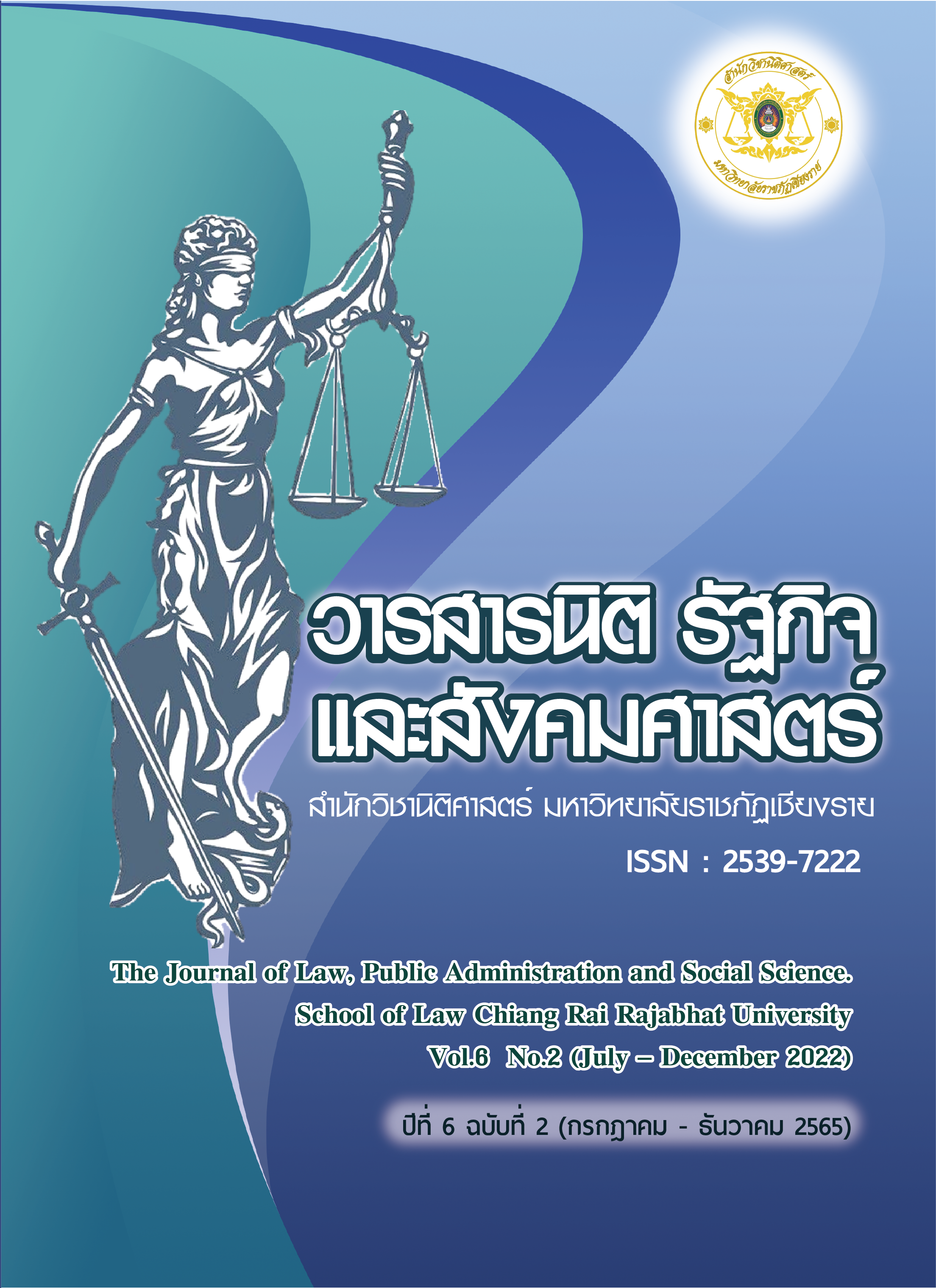A Comparative Study of the Supreme Court's Judgment in Cases of Property Recovery from Payment of Interest that Exceeds the Law
Main Article Content
Abstract
This article is a qualitative research that study documents for concepts and theories of laws relating to property recovery, loans and soliciting of over-rate interest, and the verdict of the Supreme Court in disputes of this matter. The objective is to study the Supreme Court’s verdict in situations where the borrower pays over-rate interest to the lender and what they should do when that interest is void. The Supreme Court's judgment is divided into 2 lines. On one hand, the Supreme Court sees this as arbitrary repayment where debts are repaid with the knowing that they are not obligated to pay. Thus, the borrower has no right to receive the payment back. On the other hand, the Supreme Court does not consider this as arbitrary payment. When the interest is void, the lender has no right to charge interest before default. So, the money already paid by the borrower could not be deducted from the unentitled interest. The money already paid by the borrower should be paid for all the principal.
Research results show that the Supreme Court rules the cases where the borrower pays over-rate interest by basing their judgement on the borrower's perception of interest charges. This depends whether or not, before or during contract-making, the borrower knows that the interest rate exceeds the legal limit. If the borrower knows, it is an arbitrary payment in which the borrower cannot retrieve the property. If the borrower does not know the facts, it will not be regarded as arbitrary repayment. The lender must pay the money already paid by the borrower back to the borrower according to the undue enrichment principle.
Article Details
References
คนึง ฤาไชย. กฎหมายระหว่างประเทศแผนกคดีบุคคลเกี่ยวกับธุรกิจระหว่างประเทศ. กรุงเทพฯ: วิญญูชน, 2541.
จิตติ เจริญฉ่ำ. “ฎีกาวิเคราะห์ การคืนลาภมิควรได้ที่ไม่ได้อะไรคืนเลย.” วารสารอัยการ 13, (2533): 82.
ไชยยศ เหมะรัชตะ. กฎหมายว่าด้วยสัญญา. กรุงเทพฯ: จุฬาลงกรณ์มหาวิทยาลัย, 2539.
ดาราพร ถิระวัฒน์. กฎหมายสัญญาสถานะใหม่ของสัญญาปัจจุบันและปัญหาข้อสัญญาไม่เป็นธรรม. กรุงเทพมหานคร: มหาลัยธรรมศาสตร์, 2542.
ทวีเกียรติ มีนะกนิษฐ. กฎหมายอาญาภาคทั่วไป. พิมพ์ครั้งที่ 18. กรุงเทพฯ: วิญญูชน, 2560.
นริสรา อิงคศิริ. “ปัญหาข้อห้ามเรียกคืนทรัพย์ที่ชำระหนี้ไปโดยฝ่าฝืนข้อห้ามตามกฎหมายหรือศีลธรรมอันดีตามหลักลาภมิควรได้.” วิทยานิพนธ์มหาบัณฑิต คณะนิติศาสตร์ มหาวิทยาลัยธรรมศาสตร์, 2553.
ประกาศคณะกรรมการว่าด้วยสัญญา เรื่อง ให้ธุรกิจการให้กู้ยืมเงินเพื่อผู้บริโภคของสถาบันการเงินเป็นธุรกิจที่ควบคุมสัญญา พ.ศ. 2544. ราชกิจจานุเบกษา ฉบับกฤษฎีกา เล่ม 118 ตอนพิเศษ 22 ง (6 มีนาคา 2544): 16.
ประกาศคณะกรรมการว่าด้วยสัญญา เรื่อง ให้ธุรกิจบัตรเครดิตเป็นธุรกิจที่ควบคุมสัญญา พ.ศ. 2542. ราชกิจจานุเบกษา ฉบับกฤษฎีกา เล่ม 116 ตอนพิเศษ 89 ง (3 พฤศจิกายน 2542): 58.
ประกาศธนาคารแห่งประเทศไทยที่ สนส. 1/2562 เรื่อง การกำหนดหลักเกณฑ์ วิธีการ และเงื่อนไขในการประกอบธุรกิจสินเชื่อส่วนบุคคลภายใต้การกำกับสำหรับสถาบันการเงิน. ราชกิจจานุเบกษา ฉบับกฤษฎีกา เล่มที่ 136 ตอนพิเศษ 28 ง (31 มกราคม 2562): 26.
ปรีดี เกษมทรัพย์. กฎหมายแพ่ง: หลักทั่วไป. กรุงเทพฯ: เจริญวิทย์การพิมพ์, 2525.
ไผทชิต เอกจริยกร. คำอธิบาย ยืม ฝากทรัพย์. กรุงเทพฯ: วิญญูชน, 2561.
พจนานุกรมฉบับราชบัณฑิตยสถาน พ.ศ. 2554, อ้างคำว่า “นิติเหตุ”, http://www.royin.go.th/dictionary, สืบค้นเมื่อวันที่ 20 เมษายน 2563
ไพจิตร ปุญญพันธ์. คำอธิบายประมวลกฎหมายแพ่งและพาณิชย์ลักษณะจัดการงานนอกสั่งลาภมิควรได้. กรุงเทพฯ: นิติบรรณการ, 2547.
ศุภัททิยะ ศุภางคเสน. “สัญญายืม: ศึกษาในเชิงทฤษฎี.” วิทยานิพนธ์มหาบัณฑิต คณะนิติศาสตร์ มหาวิทยาลัยธรรมศาสตร์, 2542.
สุมาลี วงษ์วิทิต. กฎหมายแพ่งและพาณิชย์ว่าด้วยละเมิดจัดการงานนอกสั่ง ลาภมิควรได้. กรุงเทพฯ: มหาวิทยาลัยรามคำแหง, 2553.
Berry Nicholas. An Introduction to Roman Law. Oxford: Clarendon Press, 1975.
Maurice Amos and F. P. Walton. Introduction to French Law. 2nd ed., Oxford: Clarendon Press, 1963.


